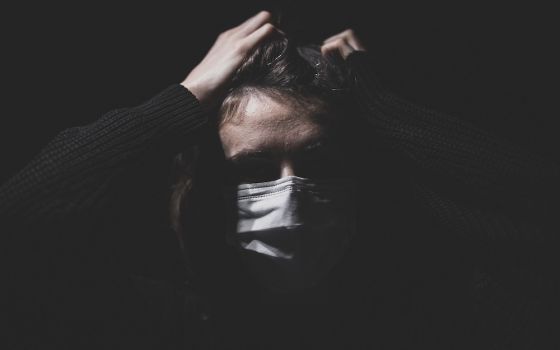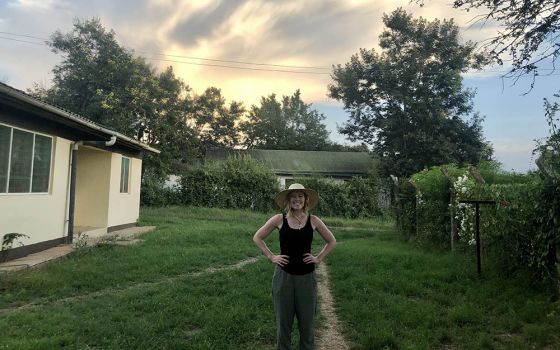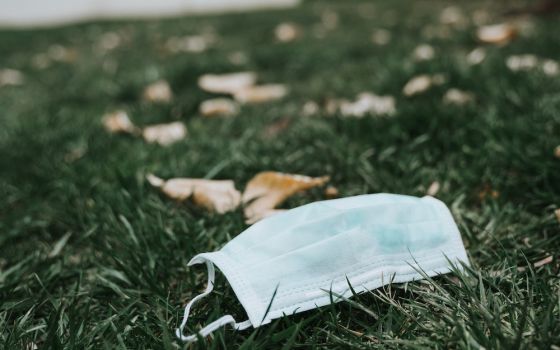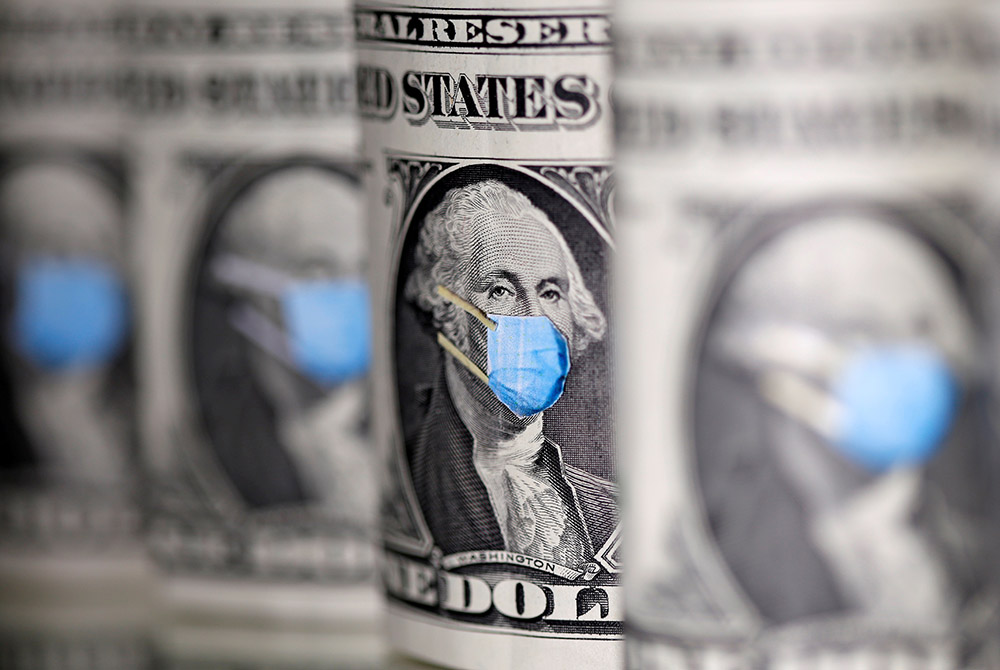
U.S. dollars are seen with face masks during the coronavirus pandemic in this illustration photo. A survey commissioned last fall by the Catholic Extension, which works to support Catholic communities in the poorest regions of the country, found that 13 of those dioceses saw an overall parish collection drop between 50-90%. (CNS/Dado Ruvic, Reuters)
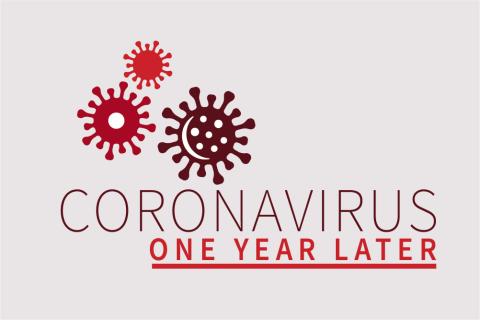
(NCR, GSR logo/Toni-Ann Ortiz)
A few weeks into the pandemic last March, Fr. Fabian Marquez, pastor of El Buen Pastor Mission in the Sparks Colonia of El Paso, in the heart of one of the poorest neighborhoods in Texas, counted the weekly collection from the parish. The grand total was $45.
During a pre-pandemic weekend, the parish offertory would run between $800 to $2,000 each week.
"When we had $2,200, we were rich," Marquez told NCR, who noted that the parish typically pulled in another thousand dollars each weekend from food sales in the parish kitchen after Masses.
During the early months of the pandemic, weekly financial contributions never exceeded $110.
A survey commissioned last fall by the Catholic Extension, which works to support Catholic communities in the poorest regions of the country, found that 13 of those dioceses saw an overall parish collection drop between 50-90%. Another 17 dioceses saw overall parish collections drop between 30-49% during the pandemic and more than 1,000 Catholic parishes in those dioceses said they would need financial assistance this year to be able to maintain basic ministry functions.
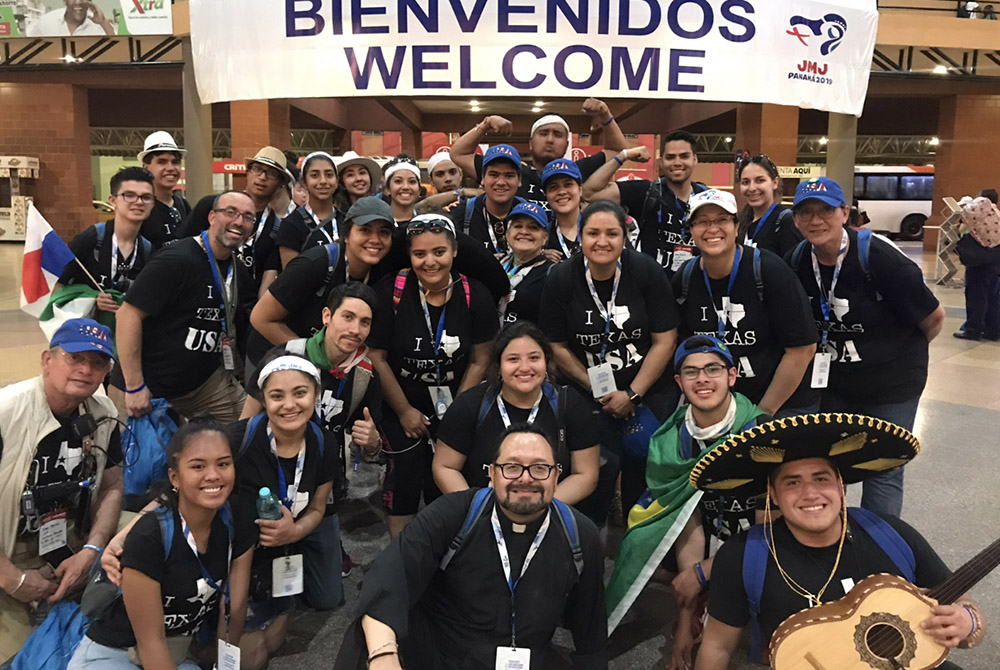
Fr. Fabian Marquez, front row, center, is pictured in this group photo. Marquez is pastor of El Buen Pastor Mission in the Sparks Colonia of El Paso, Texas. (Courtesy of Catholic Extension)
Prior to COVID-19, many of these parishes and dioceses had yet to adapt to a culture of online giving. Even for those that had the proper systems in place, many were confronted by the fact that a majority of their parishioners had lost jobs or were fearful that they may soon face unemployment. Financial contributions to the church had effectively dried up.
"When there is an economic crisis like the one we're living through, the financial situation is very dire almost immediately," Joe Boland, vice president of mission at Catholic Extension, told NCR. He noted that the majority of dioceses lack financial reserves and do not have a culture of online giving or even the means of doing so.
The combined financial assets of 86 of the nation's poorest Catholic dioceses fail to equal that of the net assets of the Archdiocese of Chicago, where Catholic Extension is headquartered, he said.
Last spring the federal government provided $349 billion in payroll support to a range of small businesses and organizations as a core component of the CARES Act. According to The Associated Press, Catholic institutions throughout the country received at least $3 billion in aid from the Payroll Protection Program, leading some critics to claim they should have relied on other assets to help survive the crisis.
Boland, who works on the frontlines with such parishes and organizations, counters that those assets, especially for the poorest dioceses, are nonexistent. One year into the COVID-19 crisis, already financially fragile dioceses and parishes find themselves in even more precarious situations as they look toward a post-pandemic world.
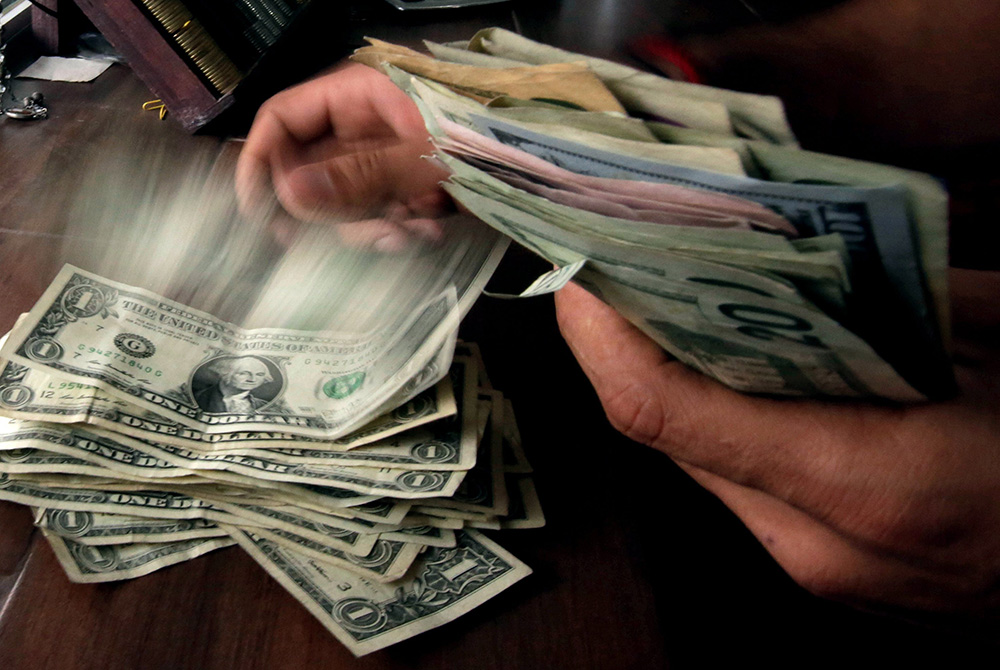
U.S. dollars are seen in this illustration photo. (CNS/Jose Luis Gonzalez, Reuters)
'Go to the Catholic Church, they'll help anybody'
Of the 50 counties that make up the Diocese of Lexington, Kentucky, 40 are in Appalachia. The coal mining at the beginning of the 20th century brought riches, but an industry that once made up a quarter of the jobs in the area now comprises less than 2% of the workforce. Today the region is rife with poverty and unemployment, and much of the land has been destroyed.
Jill Heink, grant developer for the Diocese of Lexington, recalls a recently deceased priest who was fond of telling people in need to "go to the Catholic Church, they'll help anybody."
"And it's true, we do," Heink told NCR, while acknowledging that especially during the last year, the local Catholic Church has needed its own help.
As the COVID pandemic began to wreak financial havoc on the diocese, Heink said that diocesan officials were looking to make up for anticipated shortfalls with budget cuts of approximately $1 million across the board, which could affect both jobs and diocesan programming.
Of the 40 Appalachian counties in the diocese, 35 have a Catholic parish, yet because of the remote nature of them, some are only made up of a few dozen households.
Heink said that the paycheck protection loans have helped a number of parishes, along with added support from organizations like Catholic Extension and Catholic Charities. That support has allowed for parishes like St. Stephen's in Appalachia to continue feeding over 2,500 people a month, despite a drop in donations.
Looking toward the future, she says that even though the church is operating in one of the poorest regions of the country, she's grateful that it's been able to "meet the surge in demands" in terms of caring for the community, yet looking at the uncertain financial standings, she warned that "we're still walking a fine line."
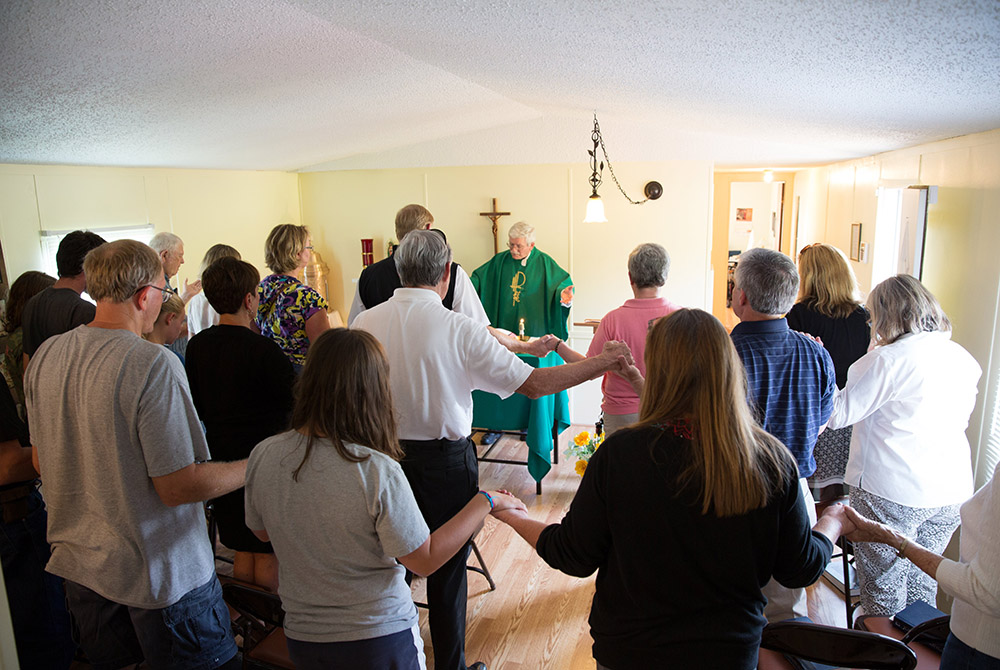
In this 2013 file photo, Mass is celebrated at St. Luke's Church in Salyersville, Kentucky, a parish in the Diocese of Lexington that is supported by Catholic Extension. The majority of the counties within the diocese are rural and in mountain areas where communities are challenged by high rates of unemployment, poverty and other problems resulting from a lack of basic necessities. (CNS/Rich Kalonick, Catholic Extension)
Weathering the storm
Reola Bellard-Reed has been a part of St. Nicholas Catholic Church in Houston, Texas, since 1977, and one thing she knows for sure: It's a Catholic community that knows how to survive.
Originally founded in 1887, the parish began as a home for former slaves and their children, and remains one of the most important churches for Black Catholics in the Galveston-Houston Archdiocese. Today, it's made up of three communities: an African American community that traces its roots back to over a century, a Cameroonian community, and an East African refugee community for an average of 400-500 attendees most Sundays before the pandemic.
When COVID-19 hit, the parish scrambled to offer online Masses, eventually getting the technology set up just before Easter — and even that wasn't especially effective.
"We have a lot of elderly people that are not online," said Bellard-Reed, who serves as the parish secretary. "We've lost a lot of people."
The archdiocese helped the parish set up online giving, although Bellard-Reed estimates that only a total of 50 to 60 parishioners have been able to utilize it to make a contribution. Since in-person Masses resumed in the summer, she noted that there's been a steep decline in attendance among the African American community, as "many of them don't have someone to bring them to church."
While African Americans have been disproportionately hit hardest by the pandemic, with the Centers for Disease Control and Prevention noting that 30% of COVID-19 patients are African American, even though they make up around 13% of the population, Bellard-Reed said that St. Nicholas has been spared.
"We've had funerals, but none of them due to COVID, so that's a blessing for us, especially in relationship with other parishes," she told NCR.
While she says the pandemic has been difficult for the parish, she's staying optimistic because in December 2024 the church building will celebrate the 100th anniversary of it being erected and she intends to be there — with COVID-19 being a thing of the past, but their ministry very much alive.
Advertisement
Across the state, in El Paso, Marquez has also been making short-term sacrifices for the sake of keeping the parish doors open.
He, along with the parish groundskeeper and the bookkeeper, forewent their salaries so that the parish secretary who was pregnant could continue to collect a paycheck until further financial assistance arrived, while the parish began to livestream Masses on Facebook and YouTube.
Eventually an online giving portal was set up, and most weekends the parish brings in an average of $600 in the offertory. "The community I serve is very blue collar, with many migrants, and they lost jobs. They were trying to survive themselves and they couldn't help us," said Marquez.
It's not sustainable long term, says Marquez, who is perennially upbeat, "but God is providing."
The parish recently received a grant of $10,000 from Catholic Extension that Marquez hopes will allow the parish to even buy a new paschal candle for Easter next month.
Marquez and Bellard-Reed are hardly alone. The plight of parishes like El Buen Pastor and St. Nicholas are playing out in similar fashion at parishes and in dioceses throughout the country.
A Villanova University study on "COVID-19 Impact on Parish Collections," surveyed 169 parishes and their giving during the pandemic and projects a 24% decline in collections for the 2021 financial year. The study, authored by professors Matthew Manion and Alicia Strandberg, concludes that "Unless more parishes turn things around ... there will likely be significant layoffs, reduction in parish services, more diocesan bankruptcies and parish closures in the year ahead."
Manion told NCR that while Paycheck Protection Program loans helped dioceses and parishes "weather the storm of last year" and "bought them time," many parishes and dioceses will now need to take a hard look at their ministries, determine what is most important and effective, and "double down their resources on that."
Organizations like Catholic Extension have helped dioceses and parishes close the short-term gaps to avoid many of the worst case scenarios, Boland says, but there is a long road ahead — but one that's worth it.
"In moments of disaster and crisis, the Catholic Church is one of the most important institutions to have around," Boland notes. "We need to make sure not just for this year, but for the long term, Catholic institutions are strong because of the work they do educating, serving the poor and providing hope to people in incredibly hopeless situations."





